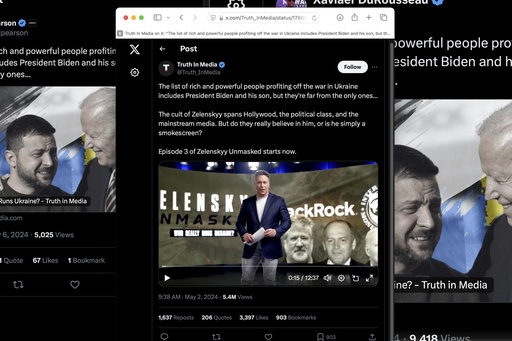
In a significant move that has raised eyebrows in the U.S., independent journalist Ben Swann, known for promoting various conspiracy theories, launched a dramatic 12-part video series aimed at exposing alleged secrets about Ukrainian President Volodymyr Zelenskyy. This series, dubbed “Zelenskyy Unmasked,” debuted in April during a crucial period when Congress was deliberating over increased military support for Ukraine. Swann’s production quickly garnered the attention of conservative influencers on social media, leading to heightened interest across their substantial follower bases.
Notably, Donald Trump Jr., the eldest son of the former president, leveraged his clout by promoting the series on platforms like X, Truth Social, and Threads, asking followers if they were “curious about the billions of dollars and weapons Congress sent Ukraine,” urging them to watch the first episode of what he described as an “explosive” series.
Contrary to other conservative figures who expressed shock over potential Kremlin financing, Swann has been openly associated with Russian state media for several years. His company reportedly profited significantly from creating content that aligns with Kremlin narratives, suggesting a troubling connection between his work and Russian propaganda themes.
The rise of “Zelenskyy Unmasked” raises alarms among U.S. intelligence and disinformation experts, highlighting how Russian-backed propaganda is spreading through social media channels. With current warnings about Russian disinformation campaigns, officials are concerned that those unaware of the influences are being used to disseminate Moscow’s messaging, especially as the U.S. gears up for its presidential elections.
Swann has been proactive in ensuring visibility for his series, hiring a digital marketing firm to push the content while some influencers disclosed receiving payment for promoting the series. This leads to the more extensive concern regarding transparency in political endorsements among social media influencers, who often do not disclose their funding sources.
As Russian interference remains a pressing issue in U.S. politics, it is particularly alarming that Swann has shown little hesitation regarding his ties to the Kremlin while maintaining his separate content production for American audiences. He filed a registration with the Justice Department for one of his companies involved with Russian media, claiming that his businesses operate independently, focusing on different audiences.
Despite his claims of separation, evidence indicates some overlap between the figures featured in his shows for American audiences and those appearing on Russian television networks affiliated with his company. Swann’s content has echoed Russian propaganda, portraying Zelenskyy as a manipulative leader who has misled Western nations into backing Ukraine in a war Russia is set to win.
Swann, once a conventional TV journalist, gained notoriety after being dismissed from an Atlanta news station for propagating the debunked “Pizzagate” conspiracy. He has since crafted a persona on social media that deliberately questions prominent narratives, frequently engaging with contentious topics such as the Sandy Hook Elementary School shooting, as well as arguments against COVID-19 vaccines.
His collaborations with organizations like Robert F. Kennedy Jr.’s anti-vaccine Children’s Health Defense reflect an ongoing commitment to controversial stances. After the shutdown of RT America following the Russian incursion into Ukraine, Swann transitioned to producing content for international audiences through his established working relationship with RT while claiming that these productions wouldn’t see airtime in the U.S.
Though his company registered under the Foreign Agents Registration Act due to its dealings with Russia, Swann abruptly ceased reporting his activities to the Justice Department earlier this year. He explained this move as a necessity advised by his legal team, despite his continued production work for RT.
Swann has publicly asserted that his series targeting Zelenskyy is funded independently, relying on wealthy sponsors, yet he declined to disclose identities. He further maintains that financial ties with Russian media have not colored his work on “Zelenskyy Unmasked,” despite acknowledging the Kremlin’s likely support of his critical take on Ukraine.
The series attracted numerous figures who have previously appeared on RT, including those connected to disinformation narratives. The series emphasizes the significance of echoed messaging across platforms, as evidenced by repeated phrases from influencers promoting Swann’s work, bridging ideology and financial backing.
As the series gained traction, highlighted by endorsements from influential conservative personalities, discussions have arisen concerning the authenticity and independence of the promotional messages. Social media users pointed out potential disinformation connected to Swann’s work, particularly focusing on his Russian affiliations.
Amid this complex environment, the reactions of conservative influencers to Swann’s video series indicate a broader pattern where political narratives and influencer marketing intersect, reshaping the landscape of modern political discourse. Despite warnings and clarifications regarding the series’ motives and affiliations, prominent figures continue to amplify its reach, suggesting that disinformation remains a potent challenge as the U.S. approaches its next election.
